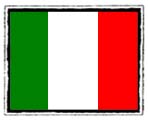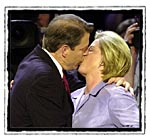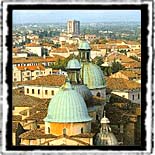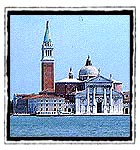|
NewsHour Extra: Full coverage of this year's presidential election Online NewsHour: Election 2000--Presidential and Congressional politics Analyzing the latest British Election Outside
Links: |
What Italian and British teens think How much do people around the world know about the U.S. Presidential elections? You'd be surprised how much interest and awareness there is.
The Brits
A good natured argument has developed between several British teens. They know who's running for the American presidency and they know who they'd vote for. Few, however have heard of Ralph Nader or any of the third party candidates. In the U.K. elections are held without much notice so there's far less campaigning than in the U.S. "U.S. election methods are cheesy," says Chris Tavender. He's 17 years old and goes to school in the south of England.
In the United Kingdom there are no primary elections along U.S. lines, nor would such a system be easy, because the timing of general elections is unpredictable.
Voters usually get three weeks' notice of a general election. The expenses of parliamentary candidates are strictly limited. These provisions and uncertainty about the timing of an election produce inexpensive campaigns which are very short by American standards. Uncertainty about
the timing of a general election, has produced the British phenomenon
of the Opposition. Its decisive characteristic is that it Views from afar In the United Kingdom almost all students have access to the Internet at school but fewer have home Internet connections. "I've been
getting my information from newspapers," says Chris. "I don't
really watch television very much. I think Gore is my favorite. I don't
feel that the presidency should be a family thing-- I don't like the
idea of a dynasty. I get the feeling George W, Bush thinks he's entitled
to the Do students in the United Kingdom prefer the short campaign to the American method of primaries and a long campaign period? "American elections and politicians seem fake," says Sarah Thomas, a fifteen-year-old student who attends an all girl school in London. "Too much money is spent on the campaigns. What a waste, and they seem to be trying to buy votes. The British system seems to encourage politicians to talk more about policies. There is more time in the U.S. for the candidates to feed the people propaganda-- a shorter campaign means the candidates have to focus on what the government has done." "I'm not old enough to vote, but as soon as I'm 18 I intend to vote," says Chris. "I have strong political feelings. I hope the elections are called later rather than earlier so I'm 18. Voters in England are more than just curious about what happens in the U.S. elections. British and American politics have marched together since the 1950s. In the 1980s, U.S. President Ronald Reagan was very close with Britain's conservative prime minister, Margaret Thatcher. In the '90s, America went for Clinton, and Britain went for a very similar Tony Blair.
Giovanni is 13, a student at a local school in Treviso near Venice in the north of Italy. Andre Cambeon is 14. He lives in Venice and gets his news from Italian television broadcasts about the U.S. elections and from the Internet at school.
Venice is a magnificent, ancient city crisscrossed by canals. It's easy to imagine you've taken a giant step back in time standing in one of the stone squares off the grand canal. In fact, in Italy history is all around you. It's network of towns and roads was formed thousands of years ago. Yet, Italy as a political unit is less than 200 years old. Elections Italiano Style
The first all-Italian
parliament met in 1861. In 1946 Italy became a republic. Modern Italian governments have not lasted long. In fact, Italy has had more changes of government than any other European country. That's because the Senate and Chamber of Deputies, the two houses which make up the country's Parliament are filled with a wide variety of parties. Any of these groups can challenge the prime minister-- and if successful, force him/her to call new elections. As in the United Kingdom, there is no set election schedule. The vote is given to all citizens, 18 and older. The President is elected by Parliament and 58 regional representatives. He or she appoints the prime minister and cabinet. "The U.S. system is simpler", says Claudio Cambeon,"but it's not better because of that." Claudio has just
turned 18 and is awaiting the next election in which he can vote. He's
works in one of the many museums in Venice.
"It would be hard to say which system is better because the two
are so different. I'm not saying the Italian system is better. However,
even though it's more complex I think it's more democratic. Less power
is given to the president and more to the parliament and other government
bodies. In other words, power is spread much wider. And it's easier Translated from the American But not all Italians are against the U.S. style of politics. The mayor of Rome has unveiled an American-style campaign, hoping his party will choose him as their prime minister following elections which are expected in spring. He's launched a "listening tour"-- that's new for Italy. He's challenged the current prime minister to monthly debates. He's also hired Stanley Greenberg, an American pollster who is credited with stage managing Al Gore's passionate kiss with his wife at the Democratic convention. Last week a political convention in Milan featured a lengthy kiss between the mayor and his wife. But had you heard anything about this kiss? Claudio doubts that American teens know much about the politics of Europe. "I don't know much about American politics", he says, "but I know who the candidates are. How many American teens know about Italian elections?" |

 In
the
In
the  "Gore."
"Bush."Gore."
"Gore."
"Bush."Gore." "That
picture of Al Gore kissing his wife in front of thousands-- it just
seemed too staged. Anyway, what's that got to do with politics? In America
the campaigns focus on the personal lives of the candidates too much.
The Monica Lewinsky affair is not the point. That's not what you're
voting for. It's whether you can keep the country running."
"That
picture of Al Gore kissing his wife in front of thousands-- it just
seemed too staged. Anyway, what's that got to do with politics? In America
the campaigns focus on the personal lives of the candidates too much.
The Monica Lewinsky affair is not the point. That's not what you're
voting for. It's whether you can keep the country running." The
House of Commons is elected for a maximum term of five years. At any
time during those five years, the prime minister-- who has been chosen
by the party which holds the greatest number of seats-- has the right
to ask the king or queen to dissolve Parliament and call a general election.
The
House of Commons is elected for a maximum term of five years. At any
time during those five years, the prime minister-- who has been chosen
by the party which holds the greatest number of seats-- has the right
to ask the king or queen to dissolve Parliament and call a general election.
 "I
don't like George W. Bush. He and his state of Texas stand for the inhuman
act of the death penalty. No one has a right to take another's life."
Giovanni Sies draws his hand across his throat dramatically. "Bush
stands for death. For this reason alone I hope he doesn't win."
"I
don't like George W. Bush. He and his state of Texas stand for the inhuman
act of the death penalty. No one has a right to take another's life."
Giovanni Sies draws his hand across his throat dramatically. "Bush
stands for death. For this reason alone I hope he doesn't win." "I
like Clinton. But I think I'd vote for George Bush", he says. Bush
seems intelligent to me despite what they say. He'd make a good president--
but I prefer Clinton to stay."
"I
like Clinton. But I think I'd vote for George Bush", he says. Bush
seems intelligent to me despite what they say. He'd make a good president--
but I prefer Clinton to stay." After
15 centuries of political chaos, along came
After
15 centuries of political chaos, along came